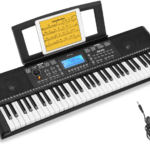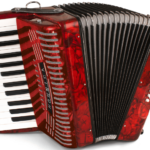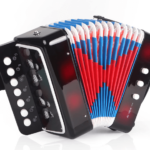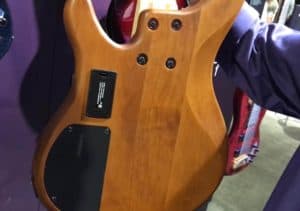There are many differences between acoustic and electric bass guitars. Electric bass guitars are more common than acoustic bass guitars. But does that mean you should choose electric?
Acoustic or electric bass for beginners – which is better? I recommend beginners to choose an electric bass guitar over an acoustic bass guitar. The electric bass is generally easier to play, and it allows you greater control over the sound. It also has greater versatility, allowing you to play with a wider variety of music genres.
Your selection would also depend on several factors, such as the genre of music you would want to play, the cost, the maintenance, and the pros and cons of each bass guitar.
In order to examine which option is better, I’ll also evaluate and compare the pros and cons of each guitar. Which between the two bass guitars suits your goals the best?
To learn more about whether an acoustic bass or electric bass guitar is better for beginners, read on!
Also, for an excellent acoustic bass guitar, take a look at our top pick, the Fender CB-60SCE Acoustic-Electric Beginner Bass Guitar:
Click here to see it on Amazon.
What’s the Difference Between the Acoustic Bass and the Electric Bass Guitar?
There are a number of differences between the acoustic and electric bass, from the type of strings to the type of outputs. See the below table for the side-by-side comparison of acoustic vs electric bass guitars for beginners.
Table of Comparison Between Acoustic Bass Guitar and the Electric Bass Guitar:
| FEATURES: | ACOUSTIC BASS GUITAR: | ELECTRIC BASS GUITAR: |
| Cost: | Less expensive; from about $150 and up | More expensive; from about $250 and up |
| Power: | No power needed | Requires power |
| Sounds: | Can be made louder or softer only | Can be amplified, modified & enhanced |
| Size of neck & body: | Wider body and thicker neck | Thinner body and slimmer neck |
| Ease of playing: | More difficult to play as strings are harder to press | Easier to play as strings are easier to press, and they are also closer to the frets |
| Production of sound: | Soundboard vibrations | Pickups and magnetic interactions |
| Versatility of music: | Less versatile | More versatile |
What is an Acoustic Bass Guitar?

An acoustic bass guitar is a type of bass guitar that produces sound through the vibration of its strings. These vibrations are then passed to a soundboard, which then amplifies the sounds.
Some singers of country, jazz, and similar music genres prefer using acoustic bass guitars because they produce richer tones, even without accompanying vocals or other musical instruments. When played alongside other instruments, though, it may not be heard without amplification.
Acoustic Bass Guitar Features
Acoustic bass guitars have some features that you should know of. First, it does not need electricity to produce sound. You can simply strum the guitar, and you’ll get a clear, rich sound. But the sound fades from a distance unless there’s an amplifier that is connected to it.
The strings are made of metal and are similar to the electric bass guitar’s strings, but they are heavier, and they create more vibrations than the electric bass. Also, you have to press them harder, as they are tougher to press than electric strings. When these strings are plucked, they cause vibrations in the soundboard.
The soundboard then magnifies the sound so that others can hear it. This is the reason why the sounds are weaker from an acoustic bass guitar. Under normal circumstances, the soundboard can magnify up to a certain extent only, but would not be as loud as the sound produced by the electric bass.
On the front portion or the face of the acoustic guitar, there’s a hollow space for the amplification of the sounds.
Acoustic Bass Pros
- Cheaper than electric bass guitars
- Energy saver – no need for electricity or power source to play
- Great for country, jazz and similar genres of music
- Can be used for practice because of weaker sound
- Can be played without additional equipment
Acoustic Bass Cons
- Discomfort in playing due to thicker neck and larger body
- Strings are more difficult to press
- Weaker sound
If you do choose to learn the acoustic bass guitar, I recommend choosing the Fender CB-60SCE Acoustic-Electric Beginner Bass Guitar:
Click here to see it on Amazon.
This acoustic bass has a beautiful Mahogany back and sides, with a solid, natural spruce top. It is lightweight and easy-to-play neck with rolled fingerboard edges. Play unplugged or plug it in for louder sound with the flexible Fishman electronics system.
What is an Electric Bass Guitar?
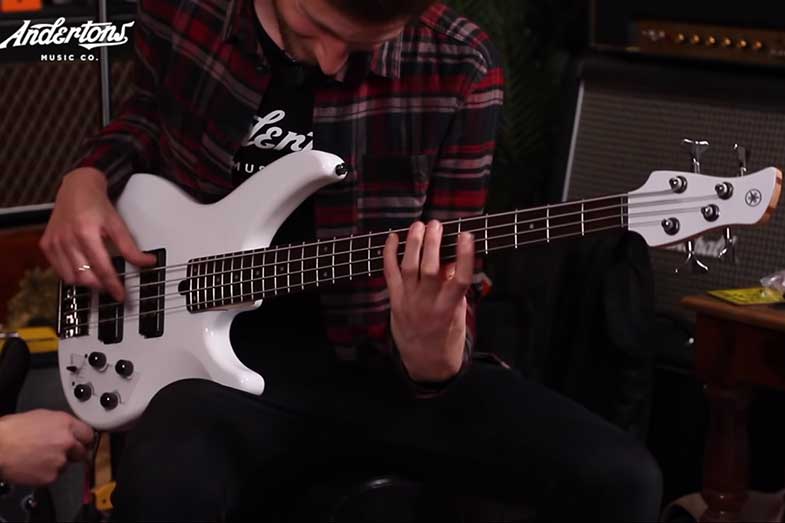
An electric bass guitar functions much the same way as an acoustic bass guitar, only it needs electricity to function well. It produces sounds with the use of magnetic pickups, which are responsible for interacting and amplifying the sound.
On the other hand, you can practice softly with an unplugged electric bass guitar, just like your acoustic bass; or wear headphones plugged into the amp.
The majority of musicians prefer the electric bass when playing on stage or when performing. They use the electric bass guitar on stage simply because it can be heard over other instruments.
Electric Bass Guitar Features
The electric bass guitar uses a power source, a pickup, tuning pegs, and magnetic parts to produce the appropriate sound. Beginners will have an easier time learning how to play the bass if they are more knowledgeable about the different parts and features.
Most electric bass guitars feature 3 band EQs and 2 pickups. These amplify the sound a lot clearer and better than the acoustic bass guitars. To change the sound produced by the electric bass, fret pressure and tuning pegs are utilized.
The vibration produced by the thinner strings of the bass is connected to 6 magnetic fields swathed in copper wire. This produces current that goes through a pre-amplifier. The pre-amplifier enhances the sound, reduces noise, and minimizes other interferences. The sound is then amplified by digital processors and transmitted to the speakers.
Beginners may find it intimidating to learn about these features because the set-up of an electric bass guitar is more complex than that of the acoustic bass. Nevertheless, to an avid learner, learning how to use the features of the electric bass guitar would be relatively easy.
Electric Bass Pros
- Convenient to play because of its slimmer neck and smaller body
- Versatile in sound and tone
- Easier to strum due to thinner strings
- Louder sound, even from a distance; plus, can be heard easily when playing with other instruments
- Blends well with rock music, pop, funk, hip hop, and also with most music genres
Electric Bass Cons
- More expensive than the acoustic bass guitar
- Needs a power source to produce maximum results
Most beginners will choose an electric bass guitar to start out with – over an acoustic bass. I also started with an electric, and I recommend you do as well if you are undecided between acoustic or electric.
When it comes to recommending beginner electric bass guitars, I am a big fan of the Yamaha TRBX204 GLB 4-String Bass Guitar. Yamaha makes some of the lightest bass guitars with thin necks that are easy and comfortable for beginners to start out on.
Click here to see it on Amazon.
The Yamaha TRBX Series is perfect for starting out on. I recommend 4-strings for beginners as easier than 5-string. Choose the 200 or 300 series. There are several colors to choose from. The 4-control circuit gives control over volume, balance, and a 2-band equalizer. It’s an all-around excellent beginner bass and will make learning easier and more enjoyable.
Pair the Yamaha TRBX bass guitar with an Orange Crush Bass Amp, and you will have an awesome, high-quality set-up at an affordable price.
Click here to see it on Amazon.
The Orange Crush Bass 25W Bass Guitar Combo Amp is one of my favorite bass guitar amps. It is only 25W, but the sound is clear and loud. It is a small, compact amp, so it fits well in smaller apartments or studios. The built-in tuner is very handy, and it weighs only about 20 pounds, making it easy to transport.
Acoustic and Electric Bass Guitar Maintenance
Both the electric and acoustic bass guitar needs proper maintenance. They should be placed in guitar cases when not in use. Exposure to extreme temperatures (extremely cold and warm temperatures) can cause damage to the bass guitar’s body and parts. The strings must be changed when they become dull and old. They also need to be tuned regularly.
The same care must be taken with the body, fretboard, and the frets. Take extra care when cleaning these parts, as you can damage them with excessive pressure, and by using harmful cleaning solutions. You can use two drops of linseed or mineral oil and a soft rag to clean your bass guitar. Be sure to wipe out all the oil afterward.
Some experts recommend a soft cloth dampened with distilled vinegar or plain water. Don’t soak the cloth – you wouldn’t want to damage the guitar by exposing it to too much water. Dry off all traces of water from your bass guitar.
For the acoustic bass, you could use a humidifier in between the strings to prevent drying up. Meanwhile, you can adjust the pickups and the preamp with extreme care.
Store your bass guitar in its own case, at room temperature 68 to 72 F (20 to 22 C), in an area where it cannot be perforated or crushed. If you don’t use it for a long time, remember to bring it out regularly to air and tune it.
Other Factors to Consider When Deciding Between Acoustic or Electric Bass
The acoustic bass guitar has a larger body due to the fact that it doesn’t have a preamp, so its body should be larger to be able to produce sufficient loudness. Nevertheless, there are acoustic-electric bass guitars wherein you can connect your acoustic bass guitar to an electric amp to amplify the sound.
Strings
They are both stringed instruments that are plucked by the fingers or by a guitar pick to produce musical sounds. The acoustic produces sound through the vibrations caused by the strumming of the strings to a soundboard that amplifies it.
The electric bass guitar uses magnetic interactions with the sound coming from the pickups. The sounds can then be toned, freed of external interferences, and then magnified.
Causes of Damage
Aside from damage caused by external forces from the environment, the player’s extreme pressure due to their extreme slapping, tapping, or strumming can cause damage as well. This type of play would cause more damage to an acoustic bass guitar than an electric type.
Slapping, tapping, or strumming by an amateur player may be too aggressive and this can unintentionally damage the musical instrument. For beginner bass players, avoid overly-aggressive slapping or strumming to avoid causing damage.
Ease of Set-up
Since the acoustic needs no other equipment, such as cables, a power source, and an amplifier, you can quickly set it up and play anywhere you want. Its simplicity is what other players appreciate. Of course, the sound would not be as loud as your electric bass guitar. An acoustic bass guitar can be used when playing before a smaller audience in a quiet place where there are no loud noise interferences.
This type of intimate performing does have an advantage as it develops genuine rapport between the audience and the bass player. This can be attributed to the cozy atmosphere and close proximity of the bass player to his audience.
You would need to play with a band with mandolins, ukeleles, or quiet acoustic guitars in order for your acoustic bass to be heard – unless you use an electric acoustic bass where the acoustic is plugged in. But then, if you’re going to plug in an acoustic bass guitar, then you might as well just use a regular electric bass guitar (unless you really want the sound of the electric acoustic bass).
Fragility
The acoustic bass is more fragile than the electric bass. The electric bass guitar is commonly made of solid wood and is less vulnerable to physical damage than your acoustic.
Price Exceptions
Electric bass guitars will cost you more money than an acoustic bass type. There are some instances though that the acoustic can be more expensive than your electric. This is especially true with some old, traditional types of acoustic basses. These very old acoustic bass guitars are being labeled as a rarity or a museum item; thus, the high price tag.
On Learning How to Play the Bass Guitar
Learn to play the bass slowly but properly. There’s no use in quickening your pace, only to learn incorrectly. Take your time and focus more on the proper techniques rather than the speed of your learning process.
How do you pluck the strings correctly? What’s the placement of your fingers on the neck? There are various websites/online apps that you could learn from. Slowly learn the correct technique, and speed will come eventually. It takes hard work and patience to learn the good techniques of playing the bass.
It took me several years to get fully comfortable with the bass guitar. I’m still learning to this day. Eventually, over time, your skill will also increase, whether it’s the acoustic bass guitar, electric bass guitar, or both!
Conclusion – Acoustic or Electric Bass for Beginners: Which is Better?
Which is better for beginners: acoustic or electric bass? The guitar you choose depends on your purpose, the type of music that you play, your skills in playing, and the budget you have to buy your bass guitar.
Based on the pros, cons, and features of both guitars, you will have a better idea of which one is best for you. I do recommend an electric bass guitar. Many electric bass guitars are very affordable now.
To help you decide, you can also take note of your preferences. You may want to prepare a checklist of the criteria that you’re looking for in a bass guitar. With a checklist, you can tick them one by one when assessing the bass guitars that you plan to purchase.
Based on the facts above, you can now decide whether the acoustic or electric bass guitar is best for you.
Related reading:
Acoustic vs Bass Guitar: What is the Difference?
Best Way to Learn Guitar [12 Tips for Learning Acoustic or Electric Guitar]
Active vs Passive Bass Guitar: Which is Better?




